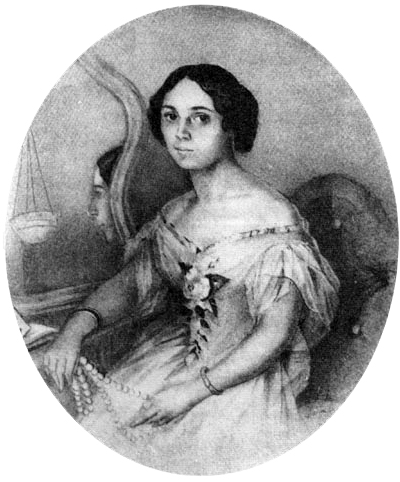Fedor Tyutchev
(1803-1873)
Ф. И. Тютчев
Silentium!
Молчи, скрывайся и таи
И чувства и мечты свои –
Пускай в душевной глубине
Встают и заходят оне
Безмолвно, как звезды в ночи, –
Любуйся ими – и молчи.
Как сердцу высказать
себя?
Другому как понять тебя?
Поймет ли он, чем ты живешь?
Мысль изреченная есть ложь.
Взрывая, возмутишь ключи, –
Питайся ими – и молчи.
Лишь жить в себе самом
умей –
Есть целый мир в душе твоей
Таинственно-волшебных дум;
Их оглушит наружный шум,
Дневные разгонят лучи, –
Внимай их пенью – и молчи!..
(Not
later than 1830)
Literal
Translation
Silentium!
Be silent,
conceal yourself and hide
Both your
feelings and your [day]dreams—
Let them
stand up and walk on
In the
depths of your soul
Silently,
like stars in the night—
Esteem [admire]
them—and be silent.
How can
the heart express itself?
How can
another understand you?
Will he
understand by what you live?
A thought
uttered is a lie.
By
stirring them up, you’ll muddy the founts (springs)—
Take
nourishment from them—and be silent.
Learn to
live solely within yourself—
In your
soul there’s a whole world
Of
secretly magical thoughts;
External
noise deafens them,
Diurnal
rays disperse them—
Hearken
unto their singing—and be silent!
d
Literary Translation/Adaptation by U.R. Bowie
Silentium!
Speak not,
live covertly and hide
Your
feelings and your dreams inside—
Let them
rise up and walk with grace
In the
depths of your soul’s most seemly place,
As silent
as night stars in tenderness wrought—
Cherish your
fancies: hush now—speak not.
How can one
heart to another get through?
Can an
alien someone comprehend you?
The crux
of your soul no one else can descry,
And once
past your lips any thought is a lie.
By
stirring the wellsprings you’ll bring up the rot—
Drink deep
from their nourishing waters—speak not.
Learn to
live solely inside your own life—
That shadowy
world in your soul-realm is rife
With cryptic
thoughts, beguiling gems;
The
world’s foul clamor deafens them,
Dispersed
they are by light, distraught—
Harken to
their song—speak not!
Translation dates and places:
Flagstaff, Yuma, Los Angeles, April, 2021
d
Translator’s Note
First
published in 1833, in the newspaper Molva (Rumor), “Silentium” is
probably Tyutchev’s best known work, and one of the most renowned poems in the
Russian language. Down through the years, millions of Russians have learned it
by heart, including Dmitry Mendeleev and Lev Tolstoy, who once was quoted as
saying, “What an astonishing thing! I don’t know a better poem.” The fourth
line of the second stanza—“A thought uttered is a lie (Once past your lips any
thought is a lie)”—has become proverbial.
d
Two More Lovely Translations of “Silentium!”
Speak not, lie hidden, and conceal
the way you dream, the things you feel.
Deep in your spirit let them rise
akin to stars in crystal skies
that set before the night is blurred:
delight in them and speak no word.
How can a heart expression find?
How should another know your mind?
Will he discern what quickens you?
A thought once uttered is untrue.
Dimmed is the fountainhead when stirred:
drink at the source and speak no word.
Live in your inner self alone
within your soul a world has grown,
the magic of veiled thoughts that might
be blinded by the outer light,
drowned in the noise of day, unheard...
take in their song and speak no word.
Translated by Vladimir Nabokov
Seal thou thy lips, to none impart
The secret dreams that fill thy heart.
Within it let them blaze and die
As do the silent stars on high
When o’er the earth night’s shadows stray –
Delight in them – and silent stay.
Thy sentiments to none confide;
From those about thee thy thoughts hide,
For when voiced what are they but lies!..
Churn up a stream, and silt will rise
And darken it… Drink, drink thou deep
Of waters clear – and silent keep.
Live in the world of self — thy soul
Of magic thoughts contains a whole
Bright universe… Let not the noise
And light of day dispel the joys
That meditation gives to thee…
Hear thy heart’s song – and silent be!
Translated by Irina Zheleznova
I would not presume to attempt a self-critique of my effort above, but here are a few comments on the other two poems, which both show signs of long and meticulous effort. Vladimir Nabokov has some lovely lines. I especially like his "stars in crystal skies that set before the night is blurred." Never mind that a later Nabokov--after he had decided that rhymed and metered translation of poetry was illegitimate and illegal--would have scorned his own line here, for deviating too far from the original. The word "blurred," of course, comes as a result of that old tyrant, Rhyme, insisting on having his way. There is only one weak line in the Nabokov poem; it's in the last stanza: "the magic of veiled words that might." That line is badly in need of more work.
Irina Zheleznova came up with the nice idea of using old English pronouns (thee and thine), and they work for her. Her first stanza is a marvel of beauty; I can find no fault with it. And her solution to describing not stirring up the wellsprings is pure genius: "churn up a stream and silt will rise and darken it." Oddly enough, she botches the most renowned line, the one about how a thought uttered is a lie: her meter breaks down here. The next to last line in the final stanza--"that meditation gives to thee"--also is unworthy of the genius of the poem as a whole.
https://www.youtube.com/watch?v=X0TWyMvOO6wA









